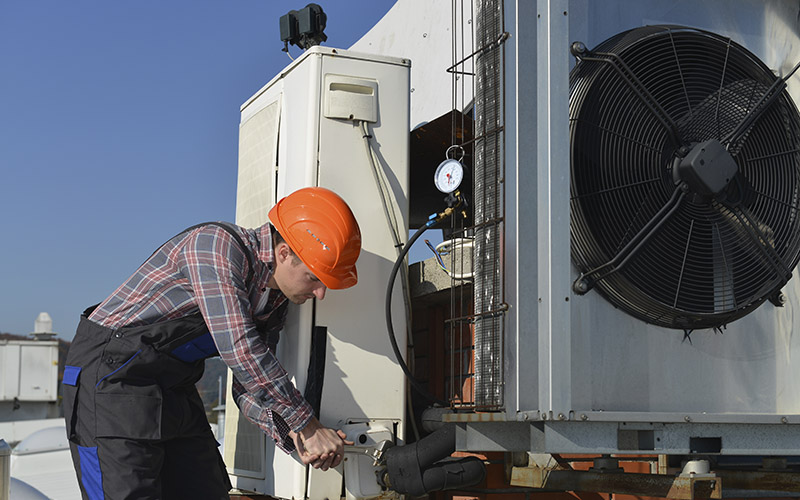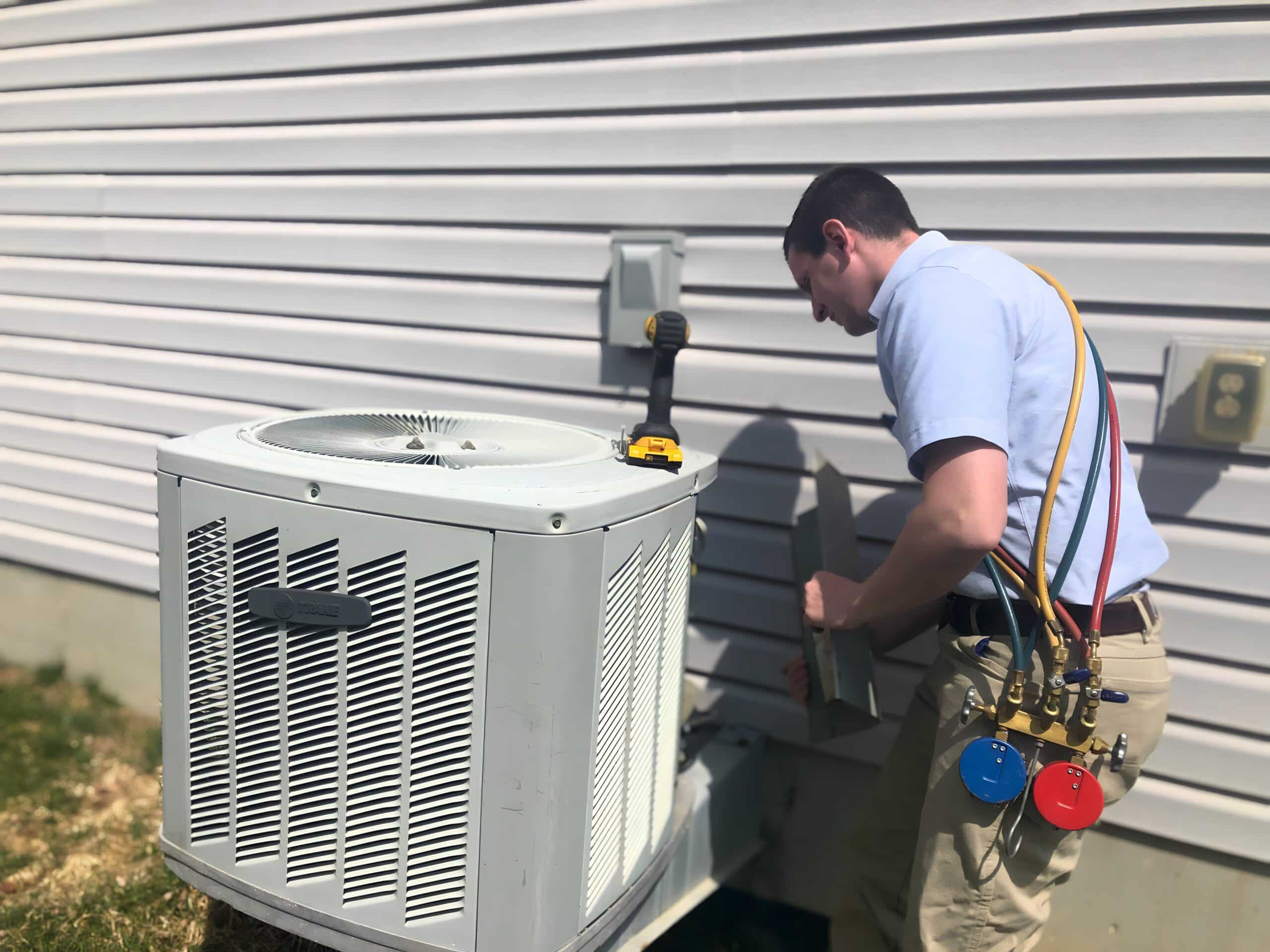Picking Between a Warmth Pump and Furnace: Secret Factors To Consider for Your Cooling And Heating Needs
When assessing home heating choices for HVAC requires, the decision in between a heatpump and a heater can be complex. Each system uses distinct advantages tailored to specific climates and energy performance objectives. Recognizing these distinctions is crucial for making an educated selection. Trick factors such as installation costs and ecological effect additionally make complex the selection process. Which alternative really lines up with one's convenience and sustainability choices? The complying with areas will discover these factors to consider in information.
Recognizing Heat Pumps: Exactly How They Work and Their Benefits
While many property owners consider numerous home heating alternatives, understanding how heatpump feature and their benefits can greatly influence their decision. Warmth pumps run by transferring warm as opposed to producing it. In the winter months, they extract heat from the outdoors air or ground and transfer it inside, while in the summertime, they reverse this process, cooling the home by eliminating warmth outside. This double functionality makes them flexible for year-round climate control.One of the primary benefits of heatpump is their energy effectiveness. They utilize substantially much less electricity compared to conventional heating unit, possibly resulting in reduced energy costs (ductless mini splits). In addition, heat pumps have a smaller sized carbon impact, making them an ecologically friendly selection. They also require less maintenance than standard systems, adding to long-term expense financial savings. Overall, comprehending the auto mechanics and advantages of warm pumps can help property owners make educated choices regarding their heating and cooling down demands
Checking Out Heating Systems: Kinds, Procedure, and Benefits
Furnaces are available in different types, consisting of gas, electrical, and oil designs, each with unique operational mechanisms. Comprehending these differences is important, as they affect efficiency and heating performance. Furthermore, furnaces offer many advantages, such as constant warmth result and dependability in chillier climates.
Sorts of Heaters
Heating unit can differ substantially in style and procedure, with heating systems being a preferred option amongst house owners. There are several kinds of heating systems, each utilizing different gas sources and modern technologies. Gas heating systems are typical, leveraging all-natural gas to generate warmth efficiently. Electric furnaces, on the other hand, utilize electric resistance to produce warmth, typically preferred for their uncomplicated installation. Oil heating systems, while much less common, work in locations with minimal gas access (heat pump installation ooltewah tn). Additionally, condensing heating systems optimize energy effectiveness by capturing and reusing exhaust gases. Each kind runs with a system of heat exchangers and ductwork to disperse warm air throughout a home. Comprehending the differences in between these heater kinds is crucial for educated HVAC decisions
Advantages of Heating systems
For homeowners looking for reliable warmth throughout cool months, the advantages of furnaces are considerable. Furnaces offer regular home heating, making sure also temperatures throughout the home. They are particularly effective in severe cool, commonly surpassing heatpump in cold problems. Numerous kinds, including gas, electrical, and oil heating systems, use versatility to fulfill diverse needs and preferences.Furnaces additionally tend to have lower initial installment costs compared to heat pumps, making them an extra easily accessible choice for many. Their durable layout contributes to a much longer lifespan, with many devices lasting over 15 years with correct maintenance. Furthermore, contemporary heaters are typically furnished with advanced modern technology for improved performance, which can bring about lowered power bills. On the whole, heaters continue to be a reliable selection for effective home heating.

Power Performance: Contrasting Warmth Pumps and Furnaces
When contrasting power effectiveness between heatpump and furnaces, the Seasonal Power Performance Ratio (SEER) plays a vital role in establishing efficiency. Furthermore, an operational price evaluation exposes the long-term economic implications of each system. Understanding these elements can assist property owners in making informed choices regarding their heating services.
Seasonal Power Efficiency Ratio
Power performance plays a necessary role in the decision-making procedure in between warmth pumps and heating systems, specifically when considering the Seasonal Energy Performance Proportion (SEER) This metric actions the cooling effectiveness of heatpump over a whole cooling period, offering a standard method to evaluate performance. Greater SEER scores indicate higher energy efficiency, converting to lower energy usage and reduced utility costs. In contrast, heating systems are generally analyzed utilizing the Yearly Fuel Application Efficiency (AFUE) ranking, which reflects heating performance. When comparing these 2 systems, home owners need to prioritize SEER scores for heatpump, as they directly influence total energy cost savings and ecological sustainability. A thorough understanding of SEER can significantly affect the long-term contentment and cost-effectiveness of the chosen heating and cooling option.
Functional Price Analysis
Comprehending the functional expenses related to heat pumps and heating systems is essential for property owners examining their alternatives. Heat pumps commonly offer higher energy effectiveness, transforming electrical power into warmth with marginal waste. This causes reduced month-to-month energy costs, especially in moderate environments. Alternatively, traditional furnaces, particularly gas models, may have reduced ahead of time prices however can incur higher functional costs in time due to fuel rates and performance ratings.Moreover, heatpump can work as both heating and cooling systems, possibly reducing the need for different cooling and heating devices. While first financial investments for heatpump might be greater, their long-term look at these guys savings in power effectiveness can make them a much more cost-efficient selection for several houses. Mindful evaluation of neighborhood energy rates is necessary to determine the finest option.
Installation Costs: What to Expect for every Heating System
Installation costs for furnace can differ considerably in between heat best site pumps and heaters, influencing home owners' decisions. Warmth pumps typically have greater upfront setup costs, commonly ranging from $3,500 to $8,000, relying on the unit size and intricacy of installment. This includes the outside device, indoor handling system, and needed ductwork alterations. On the other hand, heaters tend to have lower first prices, averaging in between $2,500 and $6,000, which can be appealing for budget-conscious home owners. Nevertheless, setup expenditures can increase if substantial ductwork is required.Moreover, the choice of fuel kind for heaters-- all-natural gas, propane, or electric-- can likewise impact installment prices. While heatpump provide energy effectiveness, their preliminary investment may hinder some customers. Inevitably, evaluating installation prices along with lasting financial savings and performance will certainly help house owners in making notified choices concerning their home heating systems.
Environment Considerations: Which System Carries Out Better in Your Location
Just how do climate conditions affect the performance of furnace? The performance of heat pumps and furnaces can differ considerably relying on the neighborhood climate. In modest environments, heatpump excel by efficiently moving warm from the outside air, making them an energy-saving alternative. Nevertheless, their effectiveness decreases in exceptionally cool temperatures, where they might have a hard time to draw out enough warmth. On the other hand, furnaces, specifically gas designs, provide dependable and regular warmth despite exterior conditions, making them more effective in colder regions.In areas that experience milder winters months, heat pumps can run effectively year-round, giving both heating & cooling. On the other hand, regions with rough wintertimes typically profit from the robustness of heating systems. Inevitably, understanding the regional environment is essential when making a decision in between a heatpump and a heater, as it straight affects their operational effectiveness and general efficiency.
Upkeep Needs: Long-Term Take Care Of Heat Pumps vs. Furnaces
While both heat pumps and heaters need regular upkeep to ensure peak performance, their details requirements and care regimens differ considerably. Furnaces typically require less frequent focus, with annual inspections sufficing to inspect for gas leaks, tidy filters, and evaluate overall capability. Their less complex style commonly enables straightforward repairs.In comparison, heat pumps necessitate biannual maintenance due to their twin role in cooling and heating. This includes cleaning coils, examining refrigerant degrees, and guaranteeing that both the exterior and interior units operate at their best. Furthermore, heatpump maintenance often includes even more intricate elements, making specialist servicing essential.Neglecting maintenance can lead to decreased performance and increased energy expenses for both systems. Inevitably, property owners must take into consideration these long-term care demands when selecting in between a warmth pump and a furnace, as proactive maintenance can prolong the life expectancy and efficiency of either system substantially.
Environmental Influence: Choosing a Sustainable Heating Option
The environmental influence of furnace is an essential examination for house owners looking for sustainable options. Warm pumps are normally extra energy-efficient than typical furnaces, as they move warmth as opposed to produce it, considerably lowering carbon exhausts. By using sustainable energy sources, such as geothermal or air-source heat pumps, homeowners can further decrease their eco-friendly footprint.On the various other hand, gas furnaces produce greenhouse gases and add to air contamination, though they commonly supply higher warmth outcome. Nevertheless, developments in technology have actually resulted in the development of high-efficiency heaters that lessen emissions.Ultimately, choosing a heater entails weighing effectiveness against ecological impact. Property owners are urged to show on local energy resources and incentives for eco-friendly systems, guaranteeing a selection that aligns with both personal convenience and environmental duty. The choice impacts not just prompt comfort yet also long-lasting sustainability and ecological health.
Often Asked Inquiries
How Much Time Do Warmth Pumps and Furnaces Usually Last?
The lifespan of heatpump normally varies from 15 to 20 years, while heating systems can last in between 15 to three decades. Regular upkeep substantially affects their durability and effectiveness in giving home heating solutions.
Can I Use a Heatpump in Very Cold Climates?
Heat pumps can operate in very cool climates, but their efficiency decreases as temperature levels decrease. In such problems, supplementary home heating resources might be essential to keep comfy interior temperature levels and ensure peak performance.

What Is the Sound Degree of Heat Pumps Versus Furnaces?
The noise levels of warm pumps and heaters differ considerably. Typically, warm pumps operate even more silently than typical furnaces, read the article making them more suitable for those sensitive to seem, while heating systems might create louder functional noises during heating cycles.
Are Warmth Pumps Suitable for Both Heating & Cooling?
Heatpump are undoubtedly ideal for both home heating and air conditioning (furnace replacement). They work by transferring warm, giving effective temperature control year-round, making them a flexible choice for property owners seeking an all-in-one HVAC solution
What Dimension Furnace Do I Need for My Home?
Identifying the appropriate size heater for a home calls for examining aspects such as square footage, insulation quality, neighborhood environment, and the home's layout. Consulting a specialist can assure a precise assessment and excellent convenience. Heat pumps generally offer greater energy performance, converting electric power into warmth with very little waste. In modest environments, heat pumps stand out by efficiently moving warmth from the outside air, making them an energy-saving option. On the other hand, furnaces, particularly gas models, supply trusted and constant warm no matter of outside conditions, making them more effective in colder regions.In areas that experience milder winters months, heat pumps can run effectively year-round, supplying both heating and cooling. Warm pumps are generally much more energy-efficient than typical furnaces, as they transfer warm instead than create it, significantly minimizing carbon emissions. By utilizing sustainable power resources, such as geothermal or air-source heat pumps, house owners can better lessen their environmental footprint.On the various other hand, all-natural gas furnaces release greenhouse gases and add to air contamination, though they frequently supply greater warmth result.